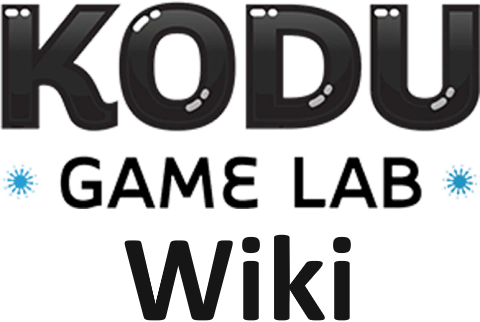| Game | Gallery | Update History |
|---|
Kodu Game Lab, originally named Boku, is a programming integrated development environment (IDE) by Microsoft's FUSE Labs. It runs on Xbox 360 and Microsoft Windows XP, Windows Vista, Windows 7, Windows 8, Windows 10 And Windows 11. It was released on the Xbox Live Marketplace on June 30, 2009. A Windows version is available to the general public for download from Microsoft's FUSE web portal.
Synopsis
Kodu Game Lab is a 3D game development environment that is designed to teach kids basic programming principles. Kodu allows creators to build the world's terrain, populate it with characters and props, and then program their behaviors and games rules in a bespoke visual programming language.
Kodu originated as a project in Microsoft Research. The original target platform was the Xbox 360 using C#, XNA, and releasing via the Indie Games Channel. The choice of releasing on the Xbox informed much of the early UI development since everything needed to be done using a game controller. Since porting to the PC, support for keyboard, mouse, and touch have been added.
The goal for Kodu has always been to be as easy as possible for new users. Guided by this goal, we've tended to design new features so that they are simple and understandable rather than more complex and complete.
Overview
Kodu is a visual programming tool which builds on ideas begun with Logo in the 1960s and other current projects such as AgentSheets, Squeak and Alice. It is designed to be accessible by anyone.
Kodu is available to download as an Xbox 1 Indie Game. There is also a PC version in an open beta which is available to anyone at their website.
Kodu is different from those other projects in several key ways:
- It avoids typing code by having users construct programs using visual elements via a game controller
- Rather than a bitmapped or 2D display, programs are executed in a 3D simulation environment, similar to Alice
Kodu Game Lab has also been used as an educational learning tool in selected schools and learning centers. Y8 have been set a task to do a 1-week project on their consoles. Students have to have over 20 marks to pass the test overall marks are 25.
Language design
Main Article: Language
Kodu's programming model is simplified and can be programmed using a gaming controller or a combination of the keyboard and mouse. It dispenses with most "serious" programming conventions, including symbolic variables, branching, loops, number and string manipulation, subroutines, polymorphism, and so on.
This simplicity is achieved by situating the programming task in a largely complete simulation environment. The user programs the behaviors of characters in a 3d world, and programs are expressed in a high-level, sensory paradigm consisting of a rule-based system or language, based on conditions and actions similarly to AgentSheets.
The typical "hello world" of Kodu is:
see - fruit - move - towards
The grammar, as it were, of this expression is:
<condition> <action>
Where <condition> is:
<sensor> [<filter> ...]
And <action> is:
<verb> [<modifier> ...]
An illustrative variant of the above program is:
see - red - fruit - move - towards - quickly
Many different types of games can be made in Kodu, such as racing, strategy, RPGs, adventure, platform, puzzle, 1st person shooters, and others.
External links
World
Main Article: World
World is the location in that a Kodu project takes place, Worlds can be made with different ground color and texture, Worlds mainly have robots in those for make a game, Many Worlds can be sent to the Kodu Game Lab Community, A page lists newest worlds and most downloaded worlds, Worlds have to be saved for continue it, but however, without saving it and enter Kodu again, the world still appears.
